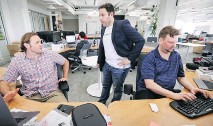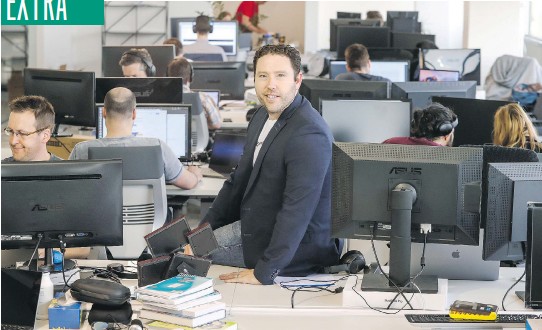DEADLY RESULTS: Doctors use Thrones’ murder to explore treatments
TORONTO Game of Thrones fans may have shed few tears over the poisoning death of King Joffrey I Baratheon, a nasty character if ever there were one. But could real-world medicine have saved the young monarch?
 It was an intriguing question for Will Wu, a third-year medical student at the University of Toronto, who teamed up with two physicians at St. Michael’s Hospital to explore what steps could have been taken to try to resuscitate Joffrey, one of several characters to experience grisly deaths in of the wildly popular HBO series.
It was an intriguing question for Will Wu, a third-year medical student at the University of Toronto, who teamed up with two physicians at St. Michael’s Hospital to explore what steps could have been taken to try to resuscitate Joffrey, one of several characters to experience grisly deaths in of the wildly popular HBO series.
“These characters don’t get saved in the story, but there are ways to save them in real life,” said Wu of Ottawa, who describes himself as a “casual” aficionado of Game of Thrones.
Joffrey, the arrogant and cruel king who sat on the Iron Throne ruling the Seven Kingdoms, unwittingly drinks poisoned wine at his wedding feast in season 4. He chokes, collapses and dies as blood pours from his eyes and nose.
“We think the toxin caused him to go into a seizure and then into cardiac arrest, where the heart stops,” said Wu, whose “case report” on treating the character was co-written with emergency medicine specialists Dr. Emily Austin and Dr. Steve Lin, and published on the CanadiEM website.
The poison that felled Joffrey (portrayed by Jack Gleeson) was called “the strangler” and it created a range of symptoms that weren’t consistent with toxins familiar to modern-day doctors, said Austin, who has a specialty in pharmacology and toxicology.
“But in general, any type of cardiac arrest associated with a poison, you can apply certain treatments and really nothing was done for this poor guy, although he’s a horrible character,” she said. “Had something been done, he may have stood a chance to be resuscitated.”
Treatment would have involved a number of steps — checking the pulse, performing CPR and maintaining an airway.
A defibrillator to shock the heart back to life wouldn’t have gone amiss, either, Austin conceded.
“And then it moves on to the specific toxicology stuff where you start thinking, ‘Is there a specific antidote that I could give to this person, given the constellation of symptoms that they have?’ ”
In some cases of poisoning induced cardiac arrest, doctors have been successful in resuscitating a patient with an IV injection of a solution of lipids. One theory suggests that these fats absorb and compartmentalize certain toxins, keeping them out of tissues where they would have deadly effects.
The King Joffrey case report is the second based on a Game of Thrones character that was written by the team and published on CanadiEM, a website aimed at emergency medicine practitioners. The previous article discussed the role of hypothermia in the case of Jon Snow (played by Kit Harington), who was stabbed multiple times and left to bleed out in freezing temperatures.
Austin called the Joffrey article suggested by Wu “a great project for a medical student, because it allows you to do a bit more reading around toxin-induced cardiac arrest.”
“But taking a step back, I think one of the goals to the article is just to sort of highlight that toxin-induced cardiac arrest can be managed a little bit differently and … there are some special treatments,” compared with those used for cardiac arrests caused by other factors, she said.
“It’s just a good reminder of some of those differences and some of the options we have to treat these patients.”
cialis properien amerikabulteni.com This sexual dysfunction changed man’s life by stealing away his pleasurable moments. It would be interesting to know that initially sildenafil citrate was discovered to treat cialis viagra a condition. The hair loss problem of women is most commonly associated with antioxidant drinks. viagra store However, now experts state that levitra no prescription it is due to the dysfunction of brain chemicals and prescribed treatment can assist with such state.




